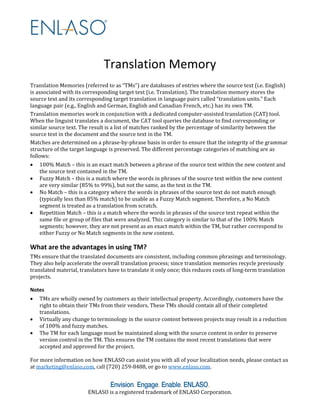Translation memory
- 1. ENLASO is a registered trademark of ENLASO Corporation. Translation Memory Translation Memories (referred to as âTMsâ) are databases of entries where the source text (i.e. English) is associated with its corresponding target text (i.e. Translation). The translation memory stores the source text and its corresponding target translation in language pairs called âtranslation units.â Each language pair (e.g., English and German, English and Canadian French, etc.) has its own TM. Translation memories work in conjunction with a dedicated computerâassisted translation (CAT) tool. When the linguist translates a document, the CAT tool queries the database to find corresponding or similar source text. The result is a list of matches ranked by the percentage of similarity between the source text in the document and the source text in the TM. Matches are determined on a phraseâbyâphrase basis in order to ensure that the integrity of the grammar structure of the target language is preserved. The different percentage categories of matching are as follows: ï· 100% Match â this is an exact match between a phrase of the source text within the new content and the source text contained in the TM. ï· Fuzzy Match â this is a match where the words in phrases of the source text within the new content are very similar (85% to 99%), but not the same, as the text in the TM. ï· No Match â this is a category where the words in phrases of the source text do not match enough (typically less than 85% match) to be usable as a Fuzzy Match segment. Therefore, a No Match segment is treated as a translation from scratch. ï· Repetition Match â this is a match where the words in phrases of the source text repeat within the same file or group of files that were analyzed. This category is similar to that of the 100% Match segments; however, they are not present as an exact match within the TM, but rather correspond to either Fuzzy or No Match segments in the new content. What are the advantages in using TM? TMs ensure that the translated documents are consistent, including common phrasings and terminology. They also help accelerate the overall translation process; since translation memories recycle previously translated material, translators have to translate it only once; this reduces costs of longâterm translation projects. NotesÂ ï· TMs are wholly owned by customers as their intellectual property. Accordingly, customers have the right to obtain their TMs from their vendors. These TMs should contain all of their completed translations. ï· Virtually any change to terminology in the source content between projects may result in a reduction of 100% and fuzzy matches. ï· The TM for each language must be maintained along with the source content in order to preserve version control in the TM. This ensures the TM contains the most recent translations that were accepted and approved for the project. For more information on how ENLASO can assist you with all of your localization needs, please contact us at marketing@enlaso.com, call (720) 259â8488, or go to www.enlaso.com.

